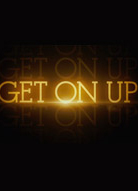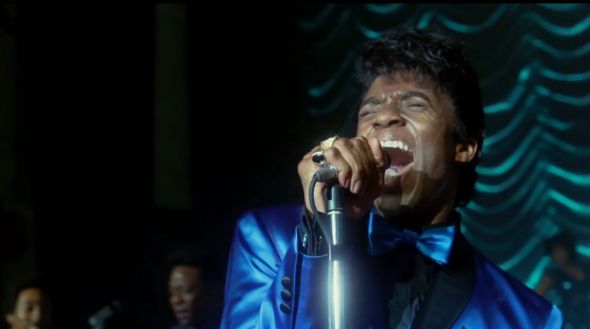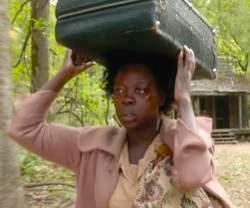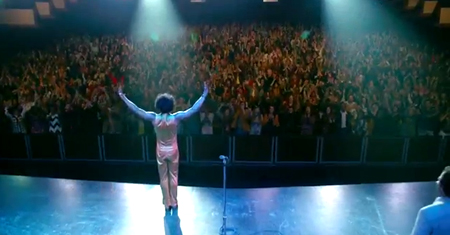Michael has joined Nathaniel on weekend review duties so you get two. Here he is on Get On Up...
 The opening scenes of Get On Up are so loose and dynamic they give the viewer reason to hope that Tate Taylor’s take on James Brown’s life story sidestepped the pitfalls that trap so many musical biopics. The film shuffles back and forth through Brown’s life with such breathless energy it’s as if the screenplay itself is possessed by the spirit of Soul Brother No. 1. It’s exhilarating, but the thrill dissipates quickly when it becomes clear that underneath the exploded chronology and the surface razzmatazz, Taylor’s film is operating from the same old biopic playbook. It turns out Get On Up is as square as the squarest prestige Oscar grab, right down to the dumb trope of pinning all of the star’s self-destructive behavior to a childhood trauma.
The opening scenes of Get On Up are so loose and dynamic they give the viewer reason to hope that Tate Taylor’s take on James Brown’s life story sidestepped the pitfalls that trap so many musical biopics. The film shuffles back and forth through Brown’s life with such breathless energy it’s as if the screenplay itself is possessed by the spirit of Soul Brother No. 1. It’s exhilarating, but the thrill dissipates quickly when it becomes clear that underneath the exploded chronology and the surface razzmatazz, Taylor’s film is operating from the same old biopic playbook. It turns out Get On Up is as square as the squarest prestige Oscar grab, right down to the dumb trope of pinning all of the star’s self-destructive behavior to a childhood trauma.
With the hyper-kinetic structure, not to mention the wall-to-wall James Brown music (which remains irresistible) it’s easy to miss the fact that the Get On Up never musters much insight into its subject. The Hardest Working Man in Show Business was the next logical choice to get the Walk the Line treatment, so here we all are. The script by Jez and John-Henry Butterworth opts for an all-of-the-above approach that skips from topic to topic without ever really coming to a point. Here’s James Brown performing in Vietnam. Here’s an unknown Brown stealing an open mic night from Little Richard. Here’s a past-his-prime Brown stoned out of his gourd, waving a shotgun around while wearing a hideous green sweat suit. No one will miss the boring old three-act arc, but the portrait of the man never emerges from the mosaic.

Flashbacks to Brown’s childhood reach for understanding but don’t arrive at anything more revealing than the idea that Brown was Destined For Greatness. As the film wears on what felt at first like stylistic boldness begins to feel awfully similar to sloppiness.
It’s a shame cause Chadwick Boseman came ready to play in the lead role. It’s a commanding locomotive of a performance, which carries the audience over all manner of questionable decisions by the filmmakers. There seems to be no obstacle Get On Up can throw in his path, which he cannot hurdle with room to spare. Clunky, often cartoonish scenes? Boseman plows right through them with his laser-focused charisma. The film loses track of Brown’s motivation? Boseman fills them in himself. The simple fact that the six-foot and handsome Boseman is nobody’s idea of a Brown look-alike? The actor overcomes this by nailing the technical details –frenetic dance moves, raspy voice, distinctive speech rhythm –then going the Hopkins as Nixon route to carry him the rest of the way, convincingly embodying the great performer’s essence. Boseman even scores through the most appalling old age makeup job since J. Edgar. It’s a blazing, star-making turn, no question.
 The only scenes where the film is firing on the level of Boseman’s performance are, not surprisingly, the ones with Viola Davis as Brown’s no-account mother. It’s not much more than a cameo, two scenes and change, but Davis proves again she doesn’t need a lot of screen time to make a big impression. The fraught confrontation when she appears unexpectedly backstage one night after Brown has hit the big time is Get On Up’s finest moment. It suggests the film that might have been had the filmmakers exercised more control over the material.
The only scenes where the film is firing on the level of Boseman’s performance are, not surprisingly, the ones with Viola Davis as Brown’s no-account mother. It’s not much more than a cameo, two scenes and change, but Davis proves again she doesn’t need a lot of screen time to make a big impression. The fraught confrontation when she appears unexpectedly backstage one night after Brown has hit the big time is Get On Up’s finest moment. It suggests the film that might have been had the filmmakers exercised more control over the material.
The most illuminating film to hold Get On Up against isn’t a musician bio, but the story of a world class sports talent letting his personal demons drive away everyone who loves him: Scorsese’s Raging Bull. Get On Up would have benefitted from emulating that film’s mercilessness when it comes to holding its protagonist accountable for his faults. To its credit, Tate’s movie includes many of Brown’s low points. He decks his wife, kicks his loyal friends to the curb and leads cops on a drug-fueled pursuit. But it lacks follow-through and strains to end the movie on an unearned note of uplift. Imagine Joe Pesci and Cathy Moriarty slathered in old age makeup yukking it up at Jake La Motta’s nightclub act and you get some notion of the lengths Get On Up goes to for a redemptive ending. Tate even has a six year old Brown turn to the camera and declare “I paid the cost to be the boss,” essentially taking the position of Brown’s enablers, beseeching you to overlook his massive failings because, hey, he’s The Godfather of Soul! The filmmakers would probably appreciate it if audiences extended that spirit of forgiveness to this slapdash misfire of a biography.

Grade: C
Oscar Chances: The film is receiving generous reviews and the praise for Boseman, and to a lesser extent Viola, is nearly unanimous. So I wouldn’t rule it out, but my hunch is that once dog days of August give way to the Fall glut of Oscar hopefuls, Get On Up will fade into memory. Also working against Boseman: He lip-synchs the vocals.
I can, however, easily picture Boseman following in the footsteps of Joaquin Phoenix in Walk the Line and Jamie Foxx in Ray by making off with the Golden Globe in the Musical/Comedy category.